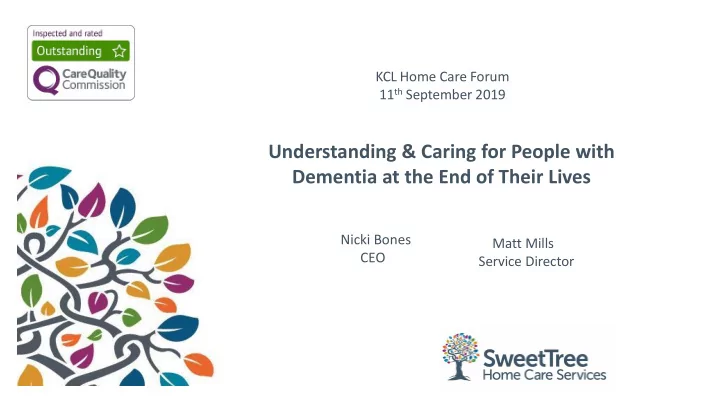

KCL Home Care Forum 11 th September 2019 Understanding & Caring for People with Dementia at the End of Their Lives Nicki Bones Matt Mills CEO Service Director
Agenda 1. The Importance of Comfort Care in Dementia 2. Assessment & Establishing Goals 3. The SweetTree Way 4. Ongoing Assessment & Review 5. Family/Formal Carer Support & Signposting
A little bit about us . . . . . SweetTree Home Care Service began life in 2002 in Swiss Cottage supporting general home care needs. 17 years on we now have six specialists services, all individually led by highly experienced clinical managers providing 2 to 24 hour care at home. • General Home Care • Dementia Care • End of Life Care • Learning Disability Support and complex care • Acquired Brain Injury • Neurological Conditions Supporting people to reach their full potential
The Importance of Comfort Care in Dementia • A study conducted by Kings College, Department of Palliative Care Policy & Rehabilitation found that England has one of the highest rates of hospital death in dementia in Europe. • Dementia is one of the main causes of disability later in life, ahead of cancer, cardiovascular disease and stroke and 30% of people aged 65 or over will die with dementia (Dixon et al, 2015). • 2 in 5 people with dementia die in hospital. However, the trend towards increasing hospital deaths has reversed, care homes as place of death has risen. Home and hospice deaths are rare .
The Im Importance of f Comfort Care in in Dementia • Dementia is not always recognised as a life limiting condition despite the bio- psychosocial impacts of dementia. • Initiatives which aim to support the end of life preferences for people with dementia should be investigated with a focus on palliation through the disease progression. • EOL Palliative Care is about supporting someone to live as well as possible.
Assessment & Goals • “Outstanding” End of Life Care should be person-centred taking into account the wishes, goals, and needs of the person and their loved ones. • Assessments should be holistic and strengths focused including physical needs, psychological needs, emotional needs, social needs, and spiritual beliefs/needs. • Goal is to promote: Choice, Compassion, Respect, Dignity, Comfort, Cleanliness, Freedom from Pain/Distress, and being in a familiar place surrounded by important people. Allow the person to define how they want to live their life and what a good death is for them.
The SweetTree Way: Understanding & Caring for the Person Initial Enquiry Evol olve ve togeth ther Plan an together ether Ongoing Taken Holistic Review and Assessment Adjust if with a Care needed Manager ACP Review Input from Input from Knowledge to ensure The Person and external and external and CHOICE & Their Information internal experts internal experts Family MDT Contacts How to Established to maintain Ensure Joint comfort, Working Client & dignity, Family choice Work togeth ther Priorities Review ew togeth ether Identified Consistency in the care team, manager, and coordinator as KEY to success.
Clinical Expertise and Specialist Knowledge • It is important to critically consider the work of other professionals and difficult questions. At the end of the day, what happens on our watch is our responsibility – its about ownership! • Our 'In – House' teams has RGN’S, RMN’S, Social Workers, Clinical Psychologist, Physiotherapists , Qualified trainers. • Each service is managed by specialist managers who recruit specialist teams to each service • Specialist Training for teams with accredited training with the SweetTree Academy
Ongoing Clinical Assessments • Reviews: What’s working, what’s not working? • Care Manager as point of central contact for any concerns/changes • Flexible approaches to care – 2- 24 hr care with senior management back up • Any adjustments needed to structure of visits addressed on an ongoing basis • Bespoke training of staff
Evidence Based Tools in Promoting Comfort • Look to prevention first, then contingency/intervention planning. • Examples: PainAD, Abbey Pain Scale, Global Deterioration Scale, Distress Thermometer, ABC approach. • Recognizing Delirium – infection management, monitoring bowels/bladder, hydration, medication, environmental factors. • When does someone want to go to hospital and for what?
Contingency planning for all …….. Many patients and their families are unprepared for ill health and frailty as a person ages. Sudden illness can lead to multiple vulnerabilities and even loss of capacity … planning can be the key ✓ Advise older people and their families to have LPA in place for health & wellbeing and finance ✓ Support advanced care planning and those difficult conversations ✓ Keep assessments and contacts up to date ✓ Advise patients on DNAR’s ✓ Have contingency plans in place for the – ‘what if ? ‘
Establishing Partnerships in Care
Family and Formal Carer Support & Signposting • How SweetTree supports families • How we support our carers • Whole systems approach – takes everyone working together to provide good care.
Additional Resources • Alzheimer’s Society – www.alzhiemers.org.uk • Marie Curie – www.mariecurie.org.uk • NHS Choices: www.nhs.uk/conditions/dementia/palliative-care/ • SCIE - www.scie.org.uk • Dementia UK/Admiral Nurses – www.dementiauk.org
References • Sleeman KE, Ho YK, Verne J, Gao W, Higginson IJ. Reversal of English trend towards hospital death in dementia: a population-based study of place of death and associated individual and regional factors, 2001-2010. Department of Palliative Care Policy & Rehabilitation, King's College London, Cicely Saunders Institute. • Palliative Care for People with Dementia: Why Comfort Matters in Long-Term Care, CaringKind: www.caringkindnyc.org • End of Life Care: Factsheet 531LP, January 2017, Alzheimer’s Society: www.alzheimers.org.uk • Dixon J, King D, Matosevic T, Clark M and Knapp M, Equity in Palliative Care in the UK, PSSRU, London: London School of Economics/Marie Curie (2015) • North West Coast Strategic Clinical Network, Palliative Care Guidelines in Dementia 2nd Edition Version 3.9 – March 2018
Recommend
More recommend